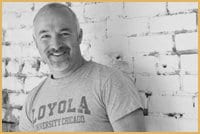The end of the world, as Jehovah’s Witnesses conceive it, looms large over Yvon Justin Côté’s debut novel Liar.
The book is essentially a bildungsroman about amoral yet charismatic gay antihero Jason, who lives life without fear of consequences. “By the time he’s four years old,” explains Côté, “he’s in a very religious family, and they’ve basically made him aware of what death is, that the world is coming to an end in 1975, so he tries to get everything in. By the time he’s seven he’s sexually active, by the time he’s 11 he’s a gambling addict, and by the time he’s 14 he’s a criminal.
“And the story basically takes you into his thoughts at that time, with the occasional fast-forward into the future.”
The Quebec-born, Vancouver-based realtor, athlete (he won two gold medals at the most recent Gay Games in Chicago, then another two at the Outgames in Montreal), actor and now author, sipping coffee at The End Café near Commercial and Broadway, explains that Liar was a labour of love that had its gestation two decades ago.
“A portion of the book was actually written when I was 17. And then it was basically just filling in the blanks of what happened before and what happened after. A little over a year ago, I decided to just sit down and try to write [it]. I’ve been writing screenplays for about 12 years as a hobby, so I’d write a screenplay then throw it in a drawer. So this kind of became a compilation of all those screenplays.
“I’d been waiting a long time to write [this book],” he continues. “I just never really thought I was ready or had the time. And I just sat down one night and started writing the first chapter, and the second chapter spewed out after that. I sent it to a few friends the next day and they kept asking me for more and more chapters. Six months later I finished the book.”
The theology of Jehovah’s Witnesses is central to understanding Liar. As Côté explains it, “They believe that God is going to intervene before man destroys the earth. They thought it was going to happen in 1975 — that was actually a big mistake that they made. They believe they have to spread the word, that’s why they go door to door. They take things in the Bible actually quite literally.”
Like his wayward protagonist, Côté was raised as a Jehovah’s Witness. “We had to go door-to-door. We had meetings three times a week. Most of the meetings that we did had to do with the Bible.”
Contrary to what one may automatically assume, growing up gay in a Jehovah’s Witness household wasn’t all horrible.
“I actually had a great childhood. I knew I was gay and therefore I knew I wouldn’t be saved when the time would come. So it really gave me a lot of freedom in the sense that I had to basically live every day and try to get as much in as I could, thinking I might not make it to high school, that I may not make it to elementary school.”
When he came out at 17, his family was accepting. “People have a very big misconception of Jehovah’s Witnesses,” says Côté. “There’s always the overly zealous ones, but that’s in any religion, where you get the crazy ones. But in general they’re just really wonderful people.”
It also helped, Côté adds, that he was never actually baptized. “You don’t get baptized usually until you’re a teenager. You have to go through a series of questions, it’s not something that’s automatic. Because I was never baptized I was never disfellowshipped. So there’s a really big difference for them if you’ve been baptized and then if you basically go against the religion’s principles. Then they shun you.
“So because I wasn’t baptized, it was okay” to be gay, he laughs.
Côté concedes that the book is at least semi-autobiographical. “A lot of it is taken from portions of my life,” he says, “but it’s also taken from the perspective of a child. So the flow of the story follows somewhat my life, but not in any sense of complete truth.”
Despite the similarities between his own life and his protagonist’s, he says that the only demons he faced while writing the book “were the ones I was dealing with at the time. I found writing brought me to another space and time where I didn’t have to be in my own thoughts. I created a new person.
“[Jason’s] past was similar to mine but I went a few steps further in everything that he did and what happened around him. I wanted to see if I could create a monster people would get attached to and love. A liar to everyone but not to the reader. An honesty deeper than any of his twisted lies. I dealt with the demons after finishing the novel.”
Côté says that people should read the novel because “it’s an experience. You get into the character’s head and you actually get to live a whole other life that isn’t your own. Everyone who’s read it so far — most people have read it in two or three days — everyone’s found something about themselves that’s there. We all have secrets, and Jason basically doesn’t hold back any secrets. There’s no holds barred.”

 Why you can trust Xtra
Why you can trust Xtra


